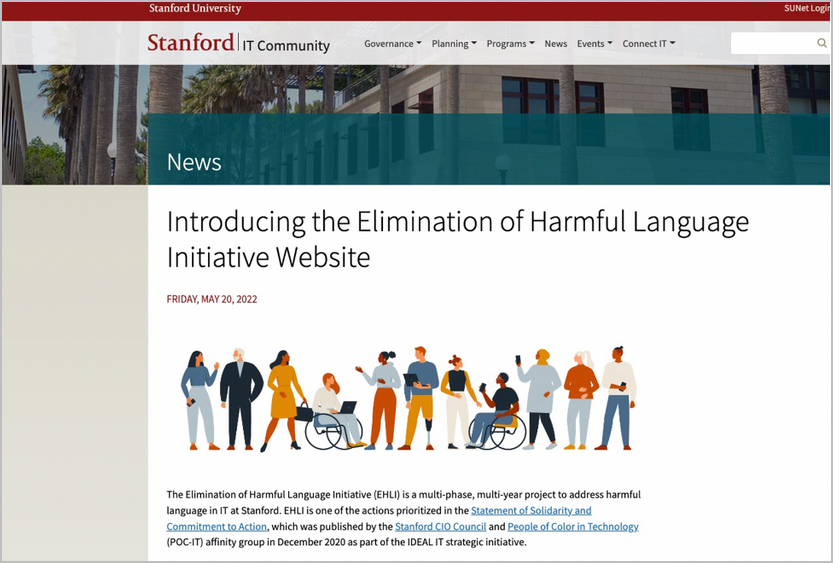
Stanford University’s initiative to replace racist and harmful terminology backfires
Further to widespread internal and external criticism and mockery, Stanford University has taken down their “Elimination of Harmful Language Initiative” (EHLI) website, created in May 2022. The EHLI was an effort co-sponsored by the Stanford CIO Council and the People of Color in Technology (POC-IT) affinity group. The primary motivation of the initiative was to promote a more inclusive and welcoming environment where individuals from all backgrounds could feel they belonged, says Steve Gallagher, Chief Information Officer at Stanford University. The fact that this work was broadly viewed as counter to inclusivity means it missed the intended mark, he adds. Stanford is currently reviewing the guide and making adjustments.
The controversy
One of the most examples that raised the most criticism was the suggestion to use the word “US citizen” instead of “American”, to avoid insinuating that the US is the most important country in the Americas. According to Michael T. Nietzel, associate professor of Political Science at Kentucky State University and author of “Taboo, 10 facts you can’t talk about”, writing for Forbes, the problem is that EHLI “failed to consider the context and the motivations of people as everyday speakers and writers. As a result, it treats people as malicious when they are not, as coarse when they are anything but that”. Many of the words and phrases on the list, he adds, are now normal forms of speech completely divorced from whatever offensive connotations.
The EHLI
There were 10 “harmful language” sections outlined in the index: ableist, ageism, colonialism, culturally appropriative, gender-based, imprecise language, institutionalised racism, person-first, violent and additional considerations.
The guide suggested replacements for several words with the potential to be harmful, including “end” or “cancel” referred to pregnancy, instead of “abort”; “child who has been trafficked” instead of “child prostitute”, so the person is not defined by just one characteristic; “accessible parking” instead of “handicap parking”; “died by suicide” instead of “committed suicide” ; “anonymous review” instead of “blind review”; “unenlightened” instead of “tone deaf”, etc.
When “woke” perhaps goes a bit too far
The guide contained some suggestions that many found to be going too far, e.g. replace “manpower” because it “reinforces male-dominated language;” “walk-in” because “walk” trivialises people with disabilities; “white paper” because white “assigns value connotations based on color (white = good). It also suggests not to use the phrase “long time no see” because it “was originally used to mock Indigenous peoples and Chinese who spoke pidgin English” and the term “Oriental” because it “is seen as pejorative as it racialises people of Asian descent as forever opposite ‘others’ (Occidental vs Oriental).” The guide also recommended that “give it a go” take the place of “take a shot at” to avoid violent imagery.
Other examples include, in racism section, the suggestion to avoid words like “black hat,” “black mark” and “black sheep” because of “negative connotations to the color black.” It also recommends to replace “grandfathered” with “legacy status” because of “roots in the ‘grandfather clause’ adopted by Southern states to deny voting rights to Blacks.”
Stanford’s position
In a press release issued on January 4, 2023 Steve Gallagher specified that the EHLI was created by and for the IT community, not the broader community, and intended as a guide, not a mandate. The initiative’s scope of “racist terminology in technology” was later expanded more broadly as “harmful language in technology”. And it was this expansion in scope, he adds, that was the heart of the intense recent feedback. Stanford will be reviewing the University’s guide for the IT community thoroughly and making adjustments.
See also, from our blog
Sources
“Ignore the Woke Panic about the English Language”, Wilfred Reilly, National Review, January 13, 2022
“Stanford University Backs Away From Its Harmful Language List”, Michael. T. Nietzel, Forbes, January 8, 2023
“Stanford pulls IT language guide that brands ‘American,’ ‘brave’ as ‘harmful’ words”, Carl Samson, Yahoo! News, January 5, 2023
“Update on Elimination of Harmful Language Initiative in Stanford’s IT Community”, Stanford University News, January 4, 2023
“Stanford University Purges English of “Harmful Language”– Including “American”, Amanda James, La Voce di New York, December 20, 2022